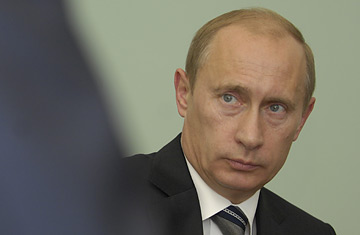
Russian President Vladimir Putin
Dmitry Peskov, 39, is a distinctly Russian press secretary. A polyglot former foreign ministry worker with a blond bristle of a moustache, he spent much of his career working in the Russian Embassy in Turkey. In his Kremlin office, he sat in an oversize armchair next to mine and smoked Marlboro Reds. In all, he came off as far more informal and direct than a Western counterpart would be. He spoke for over an hour, interrupting the conversation only for an occasional hacking cough or to answer calls as they came in, every few minutes, on his new iPhone. With elections on the way, a series of heated geopolitical statements to spin, the usually unforthcoming Russian government recently hired a U.S.-based PR firm to reach out with its side of the story. TIME's session appears to be among the early fruit of that contract.
It's a good thing, too, because the Kremlin has a lot of explaining to do. Vladimir Putin's Russia has been busy of late, reviving old sorties into international airspace, testing powerful new weaponry, and allegedly dropping a missile or two on the Western-leaning country of Georgia. The tension over a U.S. missile shield program based in Eastern Europe also promises to continue. For Peskov, the contentiousness lies in the West's inability to accept Russia's new strength. "It's always better to keep your competition down. The whole global affair is a competition," he said. "It has to be a fair competition. And Russia is ready to take part... Of course, not everybody is welcoming a new competitor."
Peskov ascribed the West's unease to both a historical chauvinism against Russia and a rigid desire to see Russia do exactly as the West does. "Some people don't understand that the Soviet Union is over. They face a completely different state, with different attitude," he said. "We are a country that shares the heart of international European values, but that is not going to repeat everything from A to Z." And Putin's vision for Russia? "I think what is wanted is that Russia is a powerful state," said Peskov, "with a prosperous population, being able to compete with others in a fair play in multipolar world where its voice is heard by others. That's it."
Freedom wasn't part of the description, and indeed Russia is headed in the opposite direction domestically, with fewer voices being heard. Even the illusion of choice, which the Kremlin had carefully managed in the 2004 elections, is crumbling. The upcoming elections (the parliament in the fall, the President in the spring) are essentially over already — it's Putin's party by a landslide — but the big question in Moscow these days is who will follow Putin as President. Unlike in Washington, there are no unauthorized leaks. There are few off-the-record chats. So when Putin named a little-known financial investigator named Viktor Zubkov Prime Minister, it surprised everyone. State-owned TV had spent the summer giving huge amounts of exposure to two tough-guy Putin proteges who seemed the likely successors, but Zubkov's appointment, first described as a feint, is now looking like an actual succession.
Peskov walked us through Zubkov's qualifications — primarily having created a successful federal money-laundering investigations unit. "He proved to be an effective manager," said Peskov. But "why him personally? That's a question for Putin. He's the President. He enjoys the trust of the people. This is his right to choose this or that person."But a few minutes later, Peskov seemed to suggest that Zubkov might not be Putin's choice to run for President. "It has to be a well-known figure, because of course Putin will share his popularity," he said. "If you share your popularity with zero, you will get zero."
Not that Putin really has anything to worry about on that score. "He's about to leave [office] being at the peak of his popularity. It's more than 70%, a phenomenon," said Peskov. So what will be Putin's next step? He won't be President by May 2008, Peskov insists. But will he leave government entirely? "I have no doubt that being such a popular man, and having such a rich experience in key affairs, there will be great demand in every sphere of this country's life."
As for freedom of the press, Peskov made a rather dubious argument that the national TV networks just couldn't support themselves financially, and that's why the government had to take them over, a move it would love to undo, he said. Peskov at least doesn't deny that new government-owned media hews closely to the administration's script. It's a natural state of affairs, he says. "Sky Channel never criticizes Rupert Murdoch," he said. "And ABC never criticizes Mickey Mouse." But he says that the smaller regional television stations that are independent are highly critical. "If you monitor that press, you will understand that this is the freest country in the world," he said, with a short laugh.
